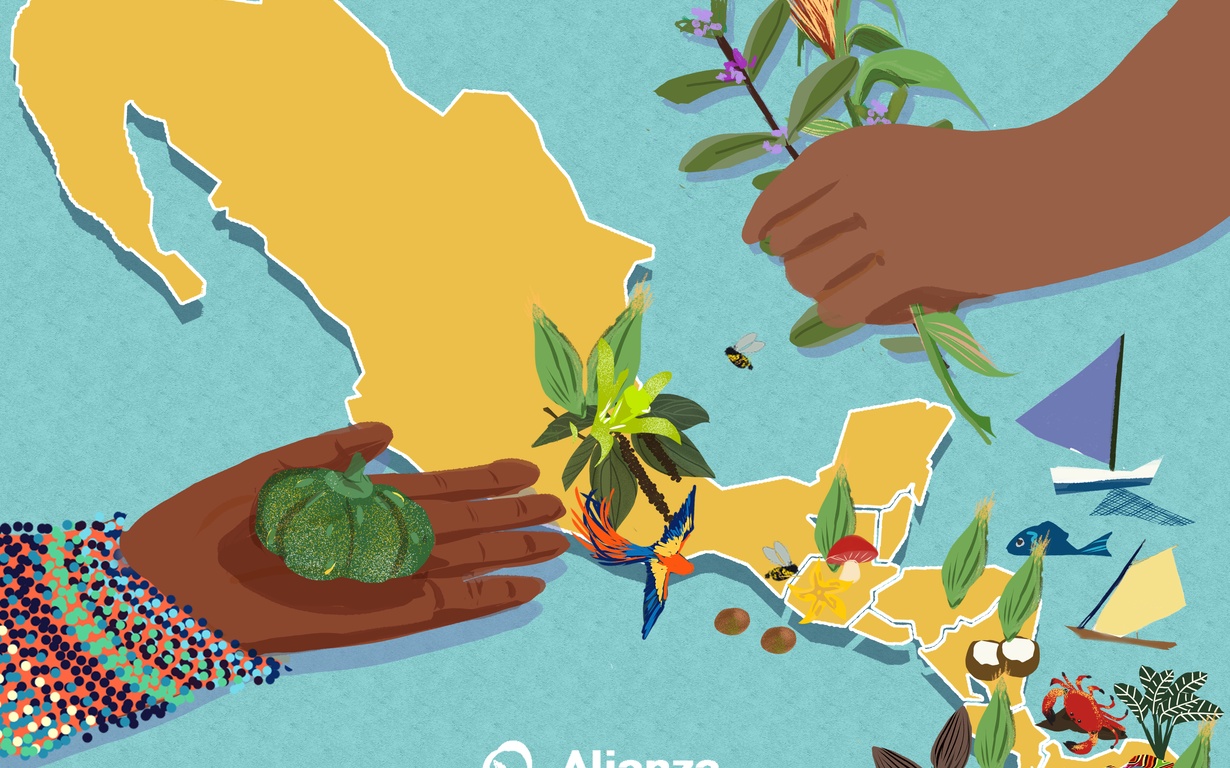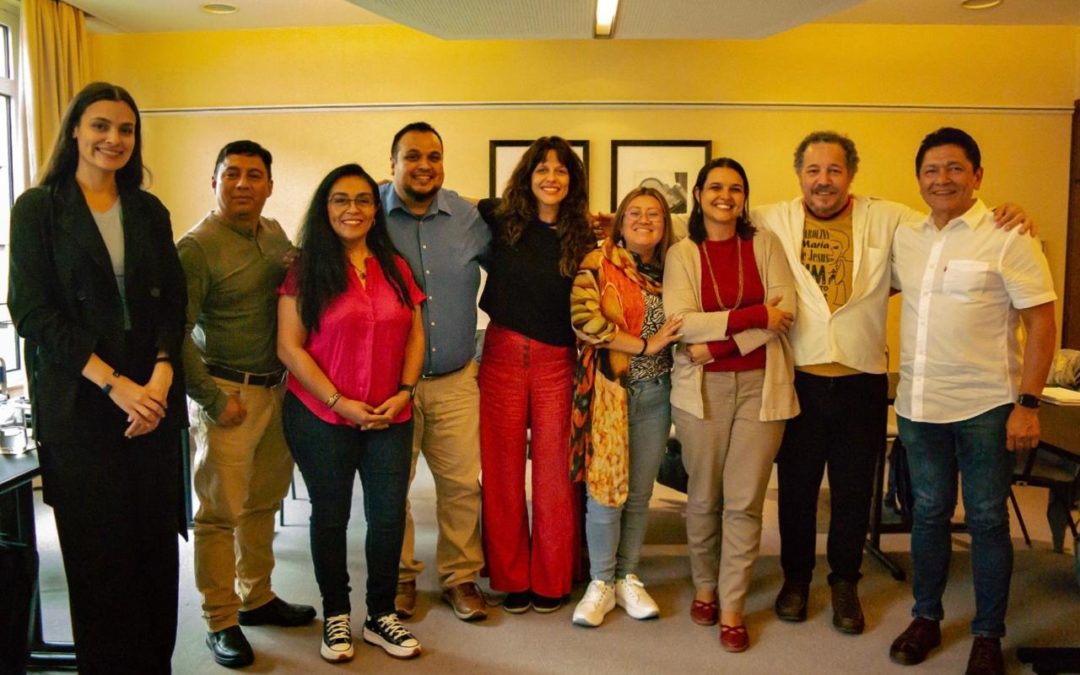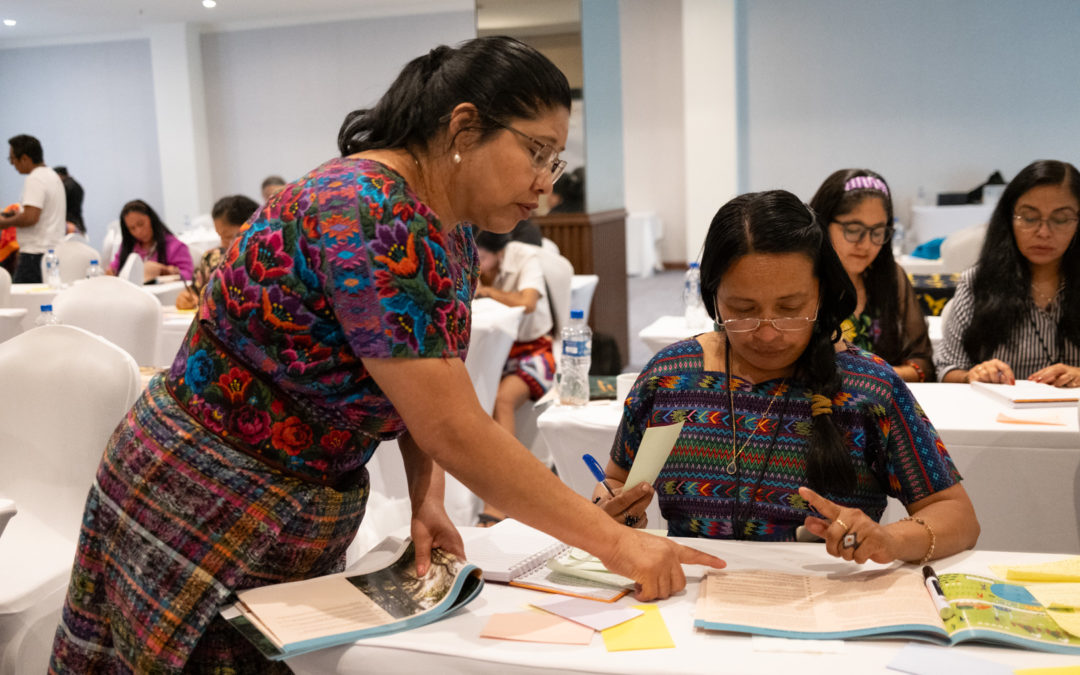This initiative represents an important milestone to revitalize indigenous and community economic practices in the region.
On October 18, leaders from Mesoamerica gathered in a virtual event with members of AMPB’s board of directors, strategic allies, donors, and members of indigenous and community organizations to present the first systematization of “Indigenous and Community Economics in Mesoamerica”.
During this meeting, they shared the results of an initial phase of collective construction of the concept of indigenous and community economy. It was approached from the Cosmovision of Indigenous Peoples and Local Communities, exploring their intrinsic relationship with the land and nature. In addition, the relevance of making this economy visible as a sustainable and sustainable model that can empower and promote the growth of women and men was highlighted.
The event allowed participants to share their experiences, challenges, and similarities.
The opening spiritual ceremony, led by Sonia Maribel Sontay Herrera, a Mayan K’iche’ woman from Momostenango, Totonicapán, focused on the importance of seeds, peace, and the preservation of territories in the midst of such violent and criminalized times in the region.
Sister organizations and allies of the Mesoamerican Alliance of Peoples and Forests, such as SUCO, the Indigenous Foundation of the Forest Stewardship Council (FSC-IF) based in Panama. The Agro-ecological Promotion Group (GPAE) of Nicaragua and the Agro-ecological Fund for the Yucatán Peninsula (FAPY) in Mexico, have been joining this process.
Returning to the roots and ancestral wisdom
This systematization is based on the cyclical conception of native peoples, a return to their roots. “The indigenous economy goes beyond what we know, it is millinery, and has left traces that have allowed the conservation of our territories in Mesoamerica,” expressed Jorge Raul Ramirez.
The event marked a starting point after the Mesoamerican Climate Week organized by the AMPB in Panama, in which the Regional Workshop on Indigenous Economy was held. This allowed the construction of the conceptualization of what is meant by Indigenous and Community Economy.
“The community economic systems are a bet and a proposal against those destructive western economic systems that have been imposed on us,” said Dina Juc, head of the Law and Culture area of AMPB.
Indigenous and local communities in Mesoamerica maintain ancestral practices that teach the preservation of common goods, such as forests, sustainable food production, and the relationship with nature and local economic systems. They also teach the exchange with other communities and populations outside the territory. These practices have allowed the continuity of many species and life on the planet. However, they have faced challenges, such as the pressure of monocultures, transgenic crops, agricultural expansion and mining, which only benefit external economic interests that have altered their traditional ways of life.
During the event, Joshua Lichtenstein, Program Director of RainForest US, shared valuable lessons learned from a global study focused on the Indigenous Economy that he conducted in collaboration with other organizations in the Amazon and South Asia several years ago.He highlighted how this study allowed the identification of best practices and stressed that improvements in livelihoods are closely related to public policies and a bottom-up, bottom-up approach to development. He also emphasized the importance of building strong relationships with other business and scientific communities.
“Indigenous, culture-based education is empowering young people to stay in their communities, connect with their elders and ancestors, and revitalize their traditional knowledge,” Joshua Lichtenstein emphasized.
Community organization systems establish order and social control reflected in their traditional systems based on the power of giving and receiving and within cultural practices of reciprocal exchange. Examples include the ancestral NAINU system of the Guna de Gunayala people of Panama, the Indigenous Stores of Virtual Exchange driven by indigenous women in Costa Rica, or the Farmers’ Market, and community economy of the Eca la Bendición community in Guatemala, to name a few.
The indigenous and community economy presents remarkable challenges and opportunities. It is crucial to take advantage of these opportunities to strengthen local cultures, promote social and economic integration, and build a more sustainable future.
The indigenous and community economy presents remarkable challenges and opportunities. It is crucial to take advantage of these opportunities to strengthen local cultures, promote social and economic integration, and build a more sustainable future. As part of this analysis process, some particular challenges that communities face on a daily basis were identified:
- Cultural Preservation: There is a gradual loss of traditional knowledge and practices due to modernization and globalization.
- Access to Resources and Financing: Communities face limitations in accessing land, forests, and financing for their community initiatives.
- Climate Change: Vulnerability to natural disasters and climate change affects the livelihoods and economic activities of these communities.
- Governance and Participation: There is a need for active participation in policy and governance to maintain the cultural and economic integrity of the communities.
This event represents an important step in building a future in which the cultural diversity and ways of life of indigenous and local communities in Mesoamerica and beyond are respected, valued and celebrated. This is just the beginning of a journey that we hope will continue to make a positive impact in the struggle to preserve nature and promote the well-being of future generations.
Who is part of the group?
The following organizations of Indigenous Peoples and Local Communities allied to create a space they called “Indigenous and Community Economy Group in Mesoamerica”:
- Bribri and Cabécar Indigenous Network -RIBCA- of Costa Rica
- Mexican Network of Peasant Forestry Organizations- MOCAF Network
- The Organization of Indigenous Community Leaders of the Twi Waupasa, Twi Yahbra, Tawira, Prinzu Auhya and Wangky Twi territories -INHWANKA RAYA- of Nicaragua.
- The Guna General Congress of Panama.
- The Federation of Agroforestry Producers, FEPROAH of Honduras.
- The Muskitia Asla Takanka -MASTA- of Honduras.
- The Association of Community Forestry of Guatemala, Utz Che’- of Guatemala.
- The Association of Forestry Communities of Petén of Guatemala.



